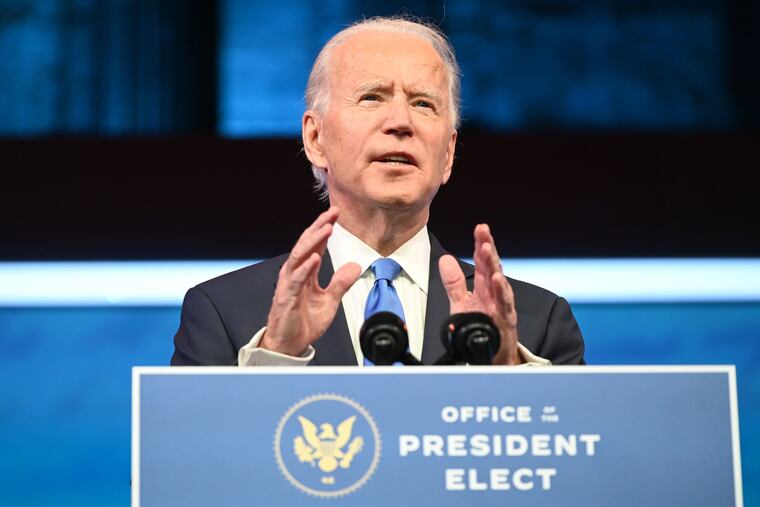Biden’s Cabinet nominees start to move through the confirmation process
Some Senate committees are moving ahead on vetting nominees, potentially leading to some being confirmed on Inauguration Day or shortly afterward.

President-elect Joe Biden’s Cabinet picks are beginning to work through the confirmation process in the Republican-controlled Senate as transition officials and Democrats press to avoid delays in putting key people in place amid the pandemic.
Despite the still simmering rancor of the election and President Donald Trump's refusal so far to recognize the outcome, some Senate committees are moving ahead on vetting nominees, potentially leading to some being confirmed on Inauguration Day or shortly afterward.
The Senate Finance Committee sent questionnaires Tuesday to Janet Yellen, the former Federal Reserve chair whom Biden has chosen to be Treasury secretary, and Xavier Becerra, the California attorney general tapped to run the Department of Health and Human Services, said Ashley Schapitl, a spokeswoman for Ron Wyden of Oregon, the top Democrat on the Finance Committee.
The Senate Foreign Relations Committee has sent its list of questions to secretary of state nominee Antony Blinken, with the potential for a hearing before the inauguration on Jan. 20, according to a person familiar.
The process has been eased by the vote Monday of the Electoral College affirming Biden's victory and by Senate Majority Leader Mitch McConnell on Tuesday acknowledging Biden as the president-elect and speaking to him by phone.
"Leaders from both parties have now recognized that President-elect Joe Biden will be sworn-in on Jan. 20th," said Andrew Bates, a spokesman for the transition team. "And the American people rightfully expect that the Senate will confirm his tested, deeply qualified, history-making Cabinet nominees as swiftly as possible to ensure that our nation is fully equipped to overcome the unprecedented coronavirus crisis, put Americans back to work, and protect our national security."
» READ MORE: Biden’s inauguration will look different. Meet the Philly woman who’s helping plan it.
That doesn't mean Biden's nominees will have an easy road ahead. Republicans have raised concerns about several of them, including Neera Tanden, the head of the Center for American Progress, to lead the Office of Management and Budget, as well as Becerra, a former senior House Democrat.
John Barrasso of Wyoming, the No. 3 Senate Republican, warned in a recent Wall Street Journal op-ed that Democrats had "hamstrung" Trump's administration when he first took office and that would have consequences.
"Don't expect Senate Republicans to forget how the Democrats treated Mr. Trump's nominees," he wrote. Republicans would "treat mainstream nominees fairly." But "those who are out of the mainstream will face a gauntlet, not a garden party."
The other question mark is control of the Senate, which won't be decided until a Jan. 5 runoff for Georgia's two seats in the chamber. Unless Democrats can pull off a double win, Republicans will remain in charge and set the pace of confirmations.
Biden’s transition team and allies including Wyden and Senate Democratic Leader Chuck Schumer have been pushing hard for Republicans to follow precedent with hearings before Inauguration Day and swift confirmations, arguing that delays would hamper Biden’s efforts to bolster a still struggling economy, stem the spread of COVID-19 and vaccinate the public.
Without his own Cabinet officials in place, Biden would have to deal with Trump-era holdovers or career officials in acting capacity.
A transition official said the president-elect's team has been engaging with staff and lawmakers and his nominees have had dozens of meetings with members of Congress.
Schumer has been pressing McConnell to begin hearings on Biden's cabinet choices shortly after the Georgia runoffs, which would put them on a timetable roughly afforded past presidents, including Trump.
McConnell declined to comment Tuesday when asked about the timing of confirmations, saying he is focused on wrapping up work with Trump first.
"The future will take care of itself," he told reporters.
Paul Light, a professor of public service at New York University and nonresident senior fellow at the Brookings Institution, said some of Biden's choices could be in for a difficult time. The confirmation process could be used by Republicans to show the GOP they are still in the fight.
"Republicans who are sitting out there looking for revenge or looking to inflict some pain, the nomination process is a wonderful playground for inflicting pain," he said.
» READ MORE: Putin denies meddling in U.S. elections
Trump may also be a factor, Light added.
"He's still fighting the fight," he said. "He hasn't gotten around to being a force in the confirmation process but I suspect he'll be happy to participate in that process and tweet from the sidelines."
Typically, the Senate's top leaders hash out an agreement at the start of the Congress in early January addressing such issues as the number of senators from each party on each committee.
That's been followed by confirmation hearings before the inauguration, especially for major posts like state, Treasury and defense.
This was true for the last four presidents, who announced a total of 115 nominees for Senate-confirmed positions before taking office and had 71 receive pre-inauguration hearings, according to the Center for Presidential Transition. Of those, 49 were Cabinet-level nominees.Only two of Trump's nominees were confirmed on Inauguration Day: Defense Secretary Jim Mattis and Homeland Security Secretary John Kelly. For a variety of reasons, including lengthy vetting procedures for nominees with complex financial holdings and opposition from individual senators, Trump had the fewest nominees confirmed on Inauguration Day out of the last four presidents. And it took the Senate much longer, on average, to confirm his initial slate of nominees.
Some, such as Michael Pompeo for CIA director and Nikki Haley as United Nations ambassador, were confirmed shortly after Inauguration Day.